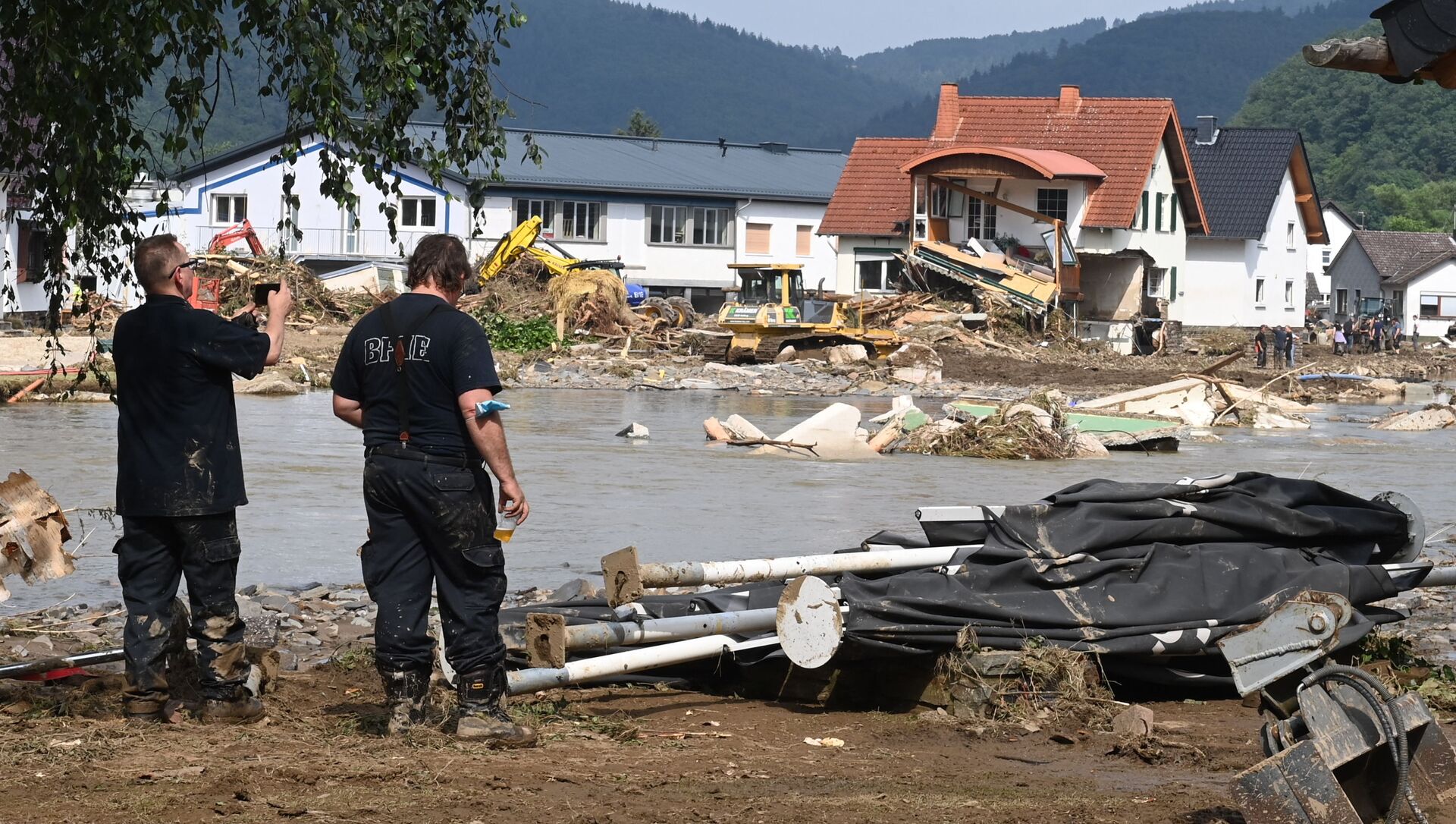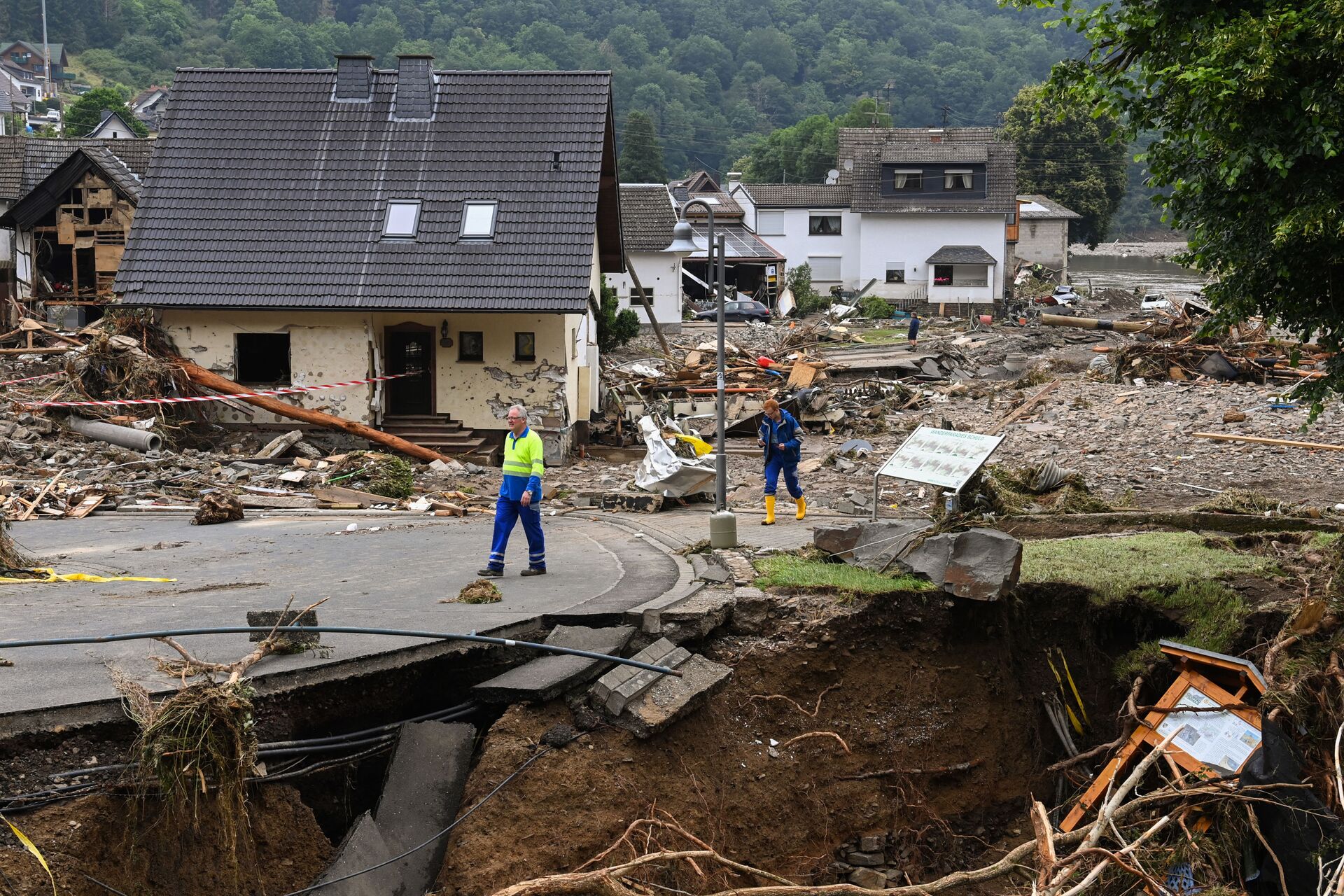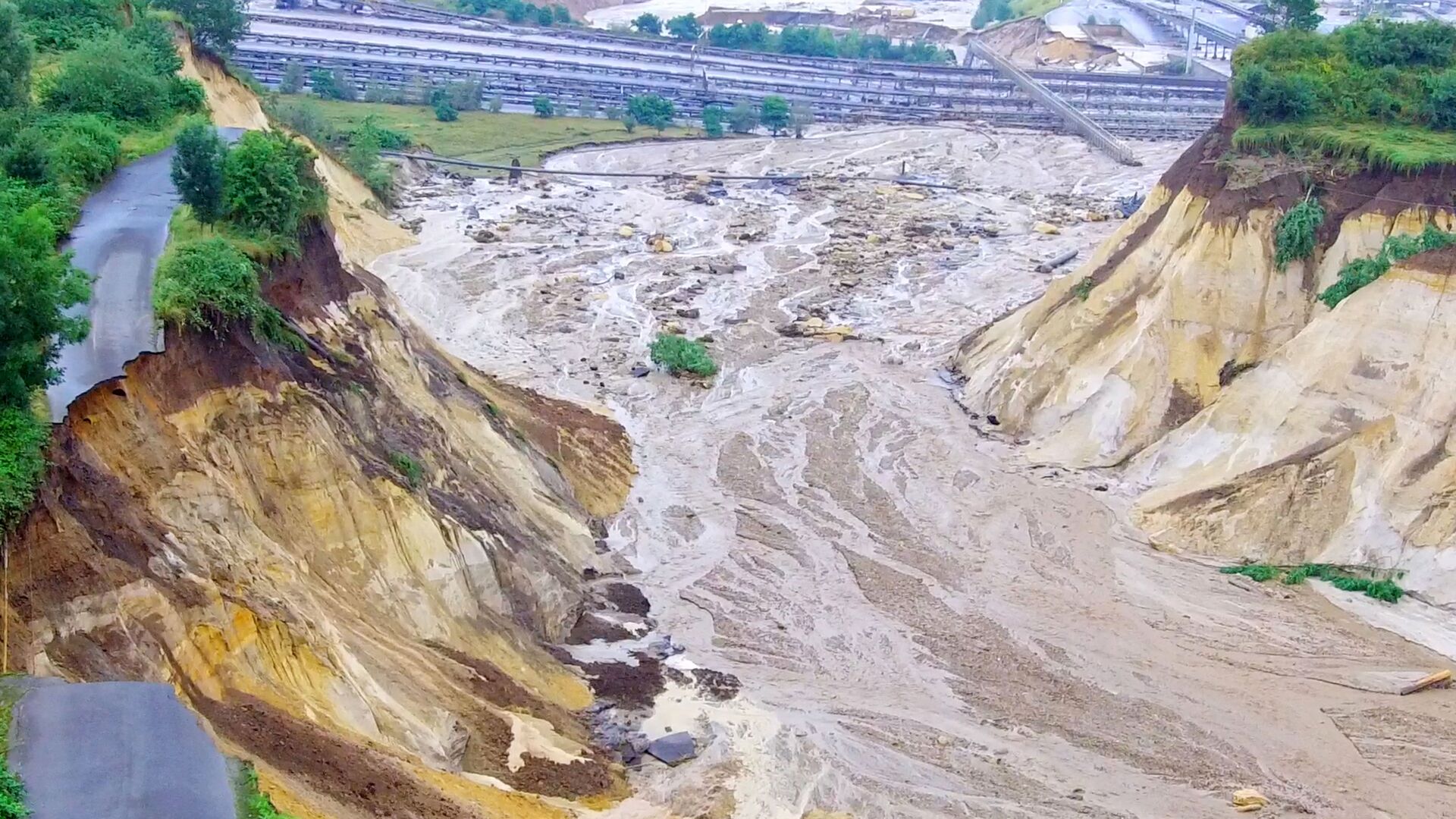Increase in Average Temperature May Lead to More Frequent Downpours in Europe, Climate Experts Say
16:30 GMT 28.07.2021 (Updated: 13:59 GMT 05.08.2022)

© AFP 2023 / CHRISTOF STACHE
Subscribe
MOSCOW (Sputnik), Jonathan Rowson - Countries in northwestern Europe are currently grappling with the fallout of a devastating series of floods that led to the deaths of more than 200 people, and experts say extreme weather events such as these could occur with far greater frequency over the coming decades due to the impact of climate change.
The recent set of extreme weather events began in London, the capital of the United Kingdom, on 12 July. Some parts of the city received a month's worth of rainfall in a single hour, leading to flash floods that resulted in some residents being evacuated from their homes.
The weather system then moved onto the European continent, where it wreaked havoc in Germany, Belgium, Austria, and the Netherlands.
The heaviest downpours were recorded on the night of July 14-15. Some regions received two months' worth of rain in 48 hours as rivers burst their banks and floodwaters tore through homes in the German states of North Rhine-Westphalia and Rhineland-Palatinate, and the Belgian region of Wallonia.
Tens of thousands of people across northwestern Europe were evacuated from their homes as experts voiced concerns that the floodwaters could trigger landslides and also lead to the collapse of dams, such as the Steinbachtal Dam, situated to the south of the German town of Euskirchen.
A landslide in the village of Blessem, near Cologne, left an unspecified number of people dead after waterlogged ground collapsed into a nearby quarry, taking homes and cars with it.
After the deadly flash floods of the preceding week, the Belgian provinces of Namur and Walloon Brabant were hit by flooding again this past Saturday.

Two men walk on a partially slipped road amid destroyed houses after the floods caused major damage in Schuld near Bad Neuenahr-Ahrweiler, western Germany, on July 16, 2021.
© AFP 2023 / CHRISTOF STACHE
More than 210 people, including approximately 170 people in Germany, are believed to have died across Europe in the recent flooding, which analysts from the German asset management company Berenberg say caused $2-3 billion in reinsurance losses.
The total damage bill is expected to be several times this figure, and an estimated 5,800 households in northwestern Germany are still without power, the grid company Westnetz said Tuesday.
Earlier on Wednesday, the Ministry of the Interior in the state of North Rhine-Westphalia said that all those who were reported missing in the floods were now accounted for, adding that the state's death toll stands at 47.
German Chancellor Angela Merkel called the damage caused by the floods, said to be the worst in living memory, "terrifying," and the German government has already pledged to offer swift financial aid to the sum of at least 300 million euros ($354 million).
Merkel also called on countries across Europe to do more to tackle climate change, which is expected to trigger more frequent extreme weather events on the European continent, although experts have urged governments to take adequate adaptation measures to prepare their countries for what may lie in wait.
Worst Floods on European Continent in Recent Memory
As several European countries pick up the pieces after the deadly floods, Steven Johan de Hertog, a climate science researcher at Vrije Universiteit Brussel, said that this summer's floods were the worst to hit northwestern Europe for decades.
"It is definitely the worst flood the region has known in recent history, both in terms of destruction and in rainfall amounts that are unprecedented within the historic record," de Hertog said.
The scale and severity of this summer's floods have led to comparisons with events that took place in the summer of 2002 when a week of sustained rain caused several major rivers in central Europe to burst their banks. The Czech capital Prague and the eastern German city of Dresden suffered major damages in the resulting floods.
The 2002 floods led to the deaths of 110 people and caused approximately 15 billion euros ($17.7 billion) in property damage, although John Sweeney, an emeritus professor of geography at Ireland's Maynooth University, said that the 2002 and 2021 floods had different drivers.
Sweeney said that the 2002 floods were the result of two separate weather systems, one from the Atlantic and one from the Mediterranean, that both produced up to 10 inches of rain in a short period.
Europe was in the midst of a heatwave earlier this summer, and the Maynooth University academic said that the warm weather was initially caused by a slow-moving anticyclone that lingered over northwestern Europe.
The heatwave conditions also allowed for more water vapour to condense in the atmosphere as clouds, Sweeney said, adding that this then triggered the slow-moving downpours that brought havoc to Germany and Belgium.
"This stalled weather system delivered two months of rainfall in two days," the Maynooth University academic said.
Hayley Fowler, a professor of climate change impacts at Newcastle University, said that the 2002 floods affected a wider area but were less devastating in terms of loss of life, and Rasmus Benestad, a climate scientist at the Norwegian Meteorological Institute, said that it was important to compare the terrain and landscape of the regions hit by floods in both 2002 and 2021.
"A difference between the two events - in addition to the rains lasting a different number of days - is that it fell over different regions. The impact does depend on the terrain and landscape, and the August 2002 floods were felt along the major river systems in Europe that directed the flood through major cities such as Budapest," Benestad said.
Sign of Things to Come?
Climate experts have warned for decades that the effects of climate change will likely trigger more frequent extreme weather events across the world.
On the European continent, any increase in average temperature could lead to more sustained, heavy downpours as warmer air can hold more water vapour, Maynooth University's John Sweeney said.
"The atmosphere can hold 7% more water vapour per degree of warming. Europe has warmed by 1°C over the past century. Population exposure has probably also increased. Damage costs will continue to increase, though measures to protect life and property can be undertaken as part of the climate adaptation process," he said.
Hayley Fowler of Newcastle University said current models indicate that slow-moving storms that bring up to 1.2 inches of rain per hour could become five times more frequent by the 2080s.
"Our results from very high-resolution climate model simulations at the UK Met Office, using models commonly used for weather forecasts, suggest that these storms will become five times more frequent by the 2080s under a business-as-usual global warming scenario. Essentially, a warmer atmosphere can hold more moisture and so these storms become more intense," Fowler said, adding that extreme weather events are occurring with greater frequency than previous models predicted.
Experts are also predicting that an expected weakening of the summer circulation of the atmosphere could increase blocking, meaning that weather patterns such as heatwaves or continuous rain will become more long-lasting over a single area.

A photo taken on July 15, 2021 shows water from the overflooded river Inde flowing into the opencast mine in Inden, western Germany, following heavy rains. - On July 15, the flood-carrying river Inde flooded a dike near the mine in Inden near Aachen and flowed into the mine. Heavy rains and floods lashing western Europe have killed at least 59 people in Germany and eight in Belgium, and many more people are missing as rising waters caused several houses to collapse.
© AFP 2023 / ALEXANDER FORSTREUTER
Rasmus Benestad of the Norwegian Meteorological Institute said that rainfall models indicate that there is an increase in the probability of heavy downpours occurring in all parts of Europe, apart from the Iberian Peninsula, adding that rainfall is becoming more concentrated and intense over specific areas.
"Another explanation is that satellite data between 1998 and 2016 suggest that the area of 24-hour rainfall has shrunk by about 7%. This means that the rain that falls will fall over a smaller area globally, hence becoming more concentrated and intense. In addition, there is the jet stream that affects where it rains and for how long, and may have played a role in the recent flooding disaster," Benestad remarked.
Maynooth University's John Sweeney also said that the summer flooding in northwestern Europe could be linked to the extreme heatwave in North America this past June, when the mercury rose above 110 degrees Fahrenheit in the Pacific north-west cities of Seattle and Portland.
"This summer has seen blocking, which has been hemispheric in extent, linking the heat domes in the western US, the heatwave in western Europe and Great Britain and Ireland, floods in Germany and Belgium, and possibly also the floods in China, though the latter may have more complex causes," Sweeney said.
Can Europe Act to Prevent Further Devastation?
The European Union has pledged to become "climate neutral" by 2050, and two weeks ago, the European Commission presented a new blueprint for achieving this goal that sets out an effective ban on the sale of fossil-fuel cars from 2035 and new strategies covering marine and airborne travel.
As part of the Paris Agreement, which was agreed at the UN Climate Change Conference (COP 21) in the French capital back in 2015, governments across the world agreed to cut emissions by a suitable amount to ensure that the global temperature rise is limited to 1.5 degrees Celsius (2.7 degrees Fahrenheit).
Even if the international community is able to achieve this aim, governments must take steps to adapt their societies to cope with the climate-related changes that this temperature rise would cause, Cecilia Tortajada, a professor in practice of environmental innovation at the University of Glasgow, said.
"In the case of the floods in Western Europe some days ago, the European Flood Database said 'climate change has both increased and decreased river floods in Europe' ... This means that we have to adapt differently depending on the country and the part of the country where we live," Tortajada said.
This sentiment was shared by Steven Johan de Hertog, who said it was vital that countries achieved carbon net-zero emissions as soon as possible.
"Even the most optimistic scenarios will leave us at a warming of 1.5°C, which is still 0.5°C warmer than present conditions. We are now experiencing some of the direct consequences of the climate change caused over the last centuries and it is going to keep getting worse until we reach net zero globally. The sooner we get this done, the better the world that we live in will be," the Vrije Universiteit Brussel researcher said.
The three main climate-related factors that will determine the future of many societies are mitigation, adaptation, and suffering, de Hertog explained, adding that "we decide ourselves how much we are going to have to do of each single one of them."
Hayley Fowler of Newcastle University said that building upstream reservoirs may help to control river levels in the future, but added that more investment was needed to bolster Europe's early warning and emergency management systems, particularly at the local level.
"Extreme events will always happen and can overwhelm even the best defences. This is why better early warning and emergency management systems are needed at local levels," she said.
This was echoed by Maynooth University researcher John Sweeney, who noted that the costs of building the required defences to protect localities against the flooding seen over the past two weeks would be prohibitive.
"The cost of protecting against, for example, a 1:10,000 year flood would be prohibitive. But better warning systems and land use planning such as those that occur in the Netherlands would alleviate the worst effects and especially the casualties," Sweeney remarked.
Looking ahead, only a concerted effort on the part of European governments to lower emissions could lead to a reverse in the worrying trend currently being seen in Europe, he added.
"In the longer term though, only a global effort to reduce greenhouse gas emissions will provide relief from what is likely to become a major European problem in the coming decades," the Maynooth University academic commented.
As many countries in northwestern Europe attempt to repair the damage caused by the recent floods, the south of the continent is experiencing a series of wildfires fueled by warm temperatures and strong winds.
Earlier in July, four people died in a wildfire on the island of Cyprus that was named the worst such event in the country's history, and firefighters in Greece, Spain, and Italy, are currently hard at work tackling multiple blazes.
These examples underline the scale of the European Union's task to not only make changes that will drastically reduce emissions, but also to adapt to the new meteorological processes that result from the current and expected rise in global temperatures.



